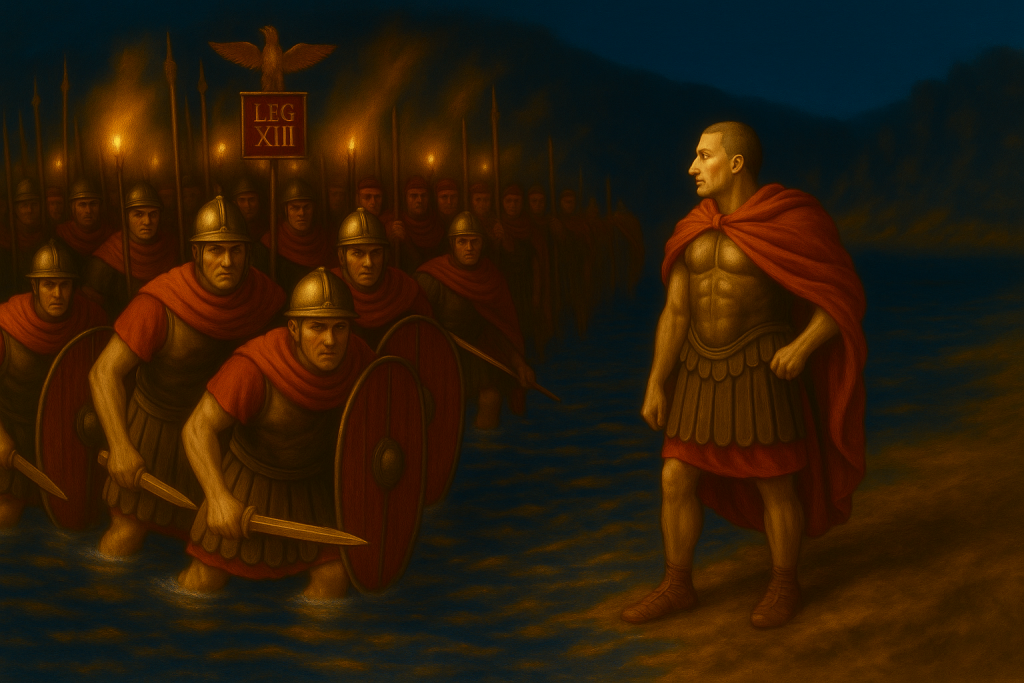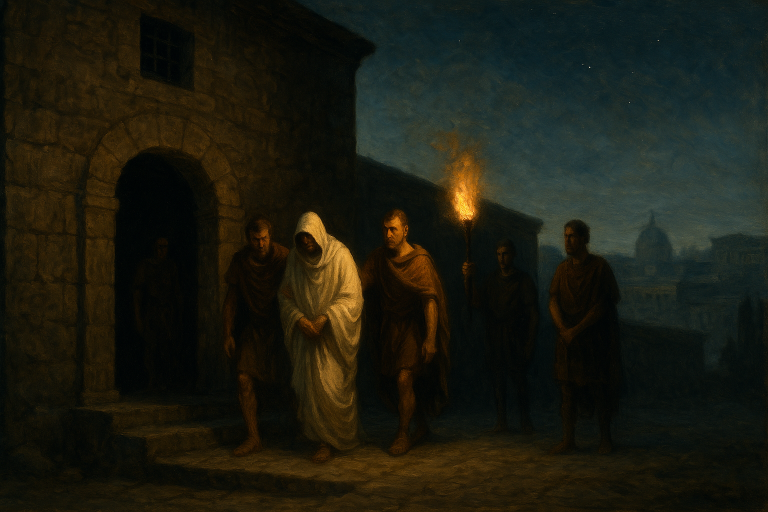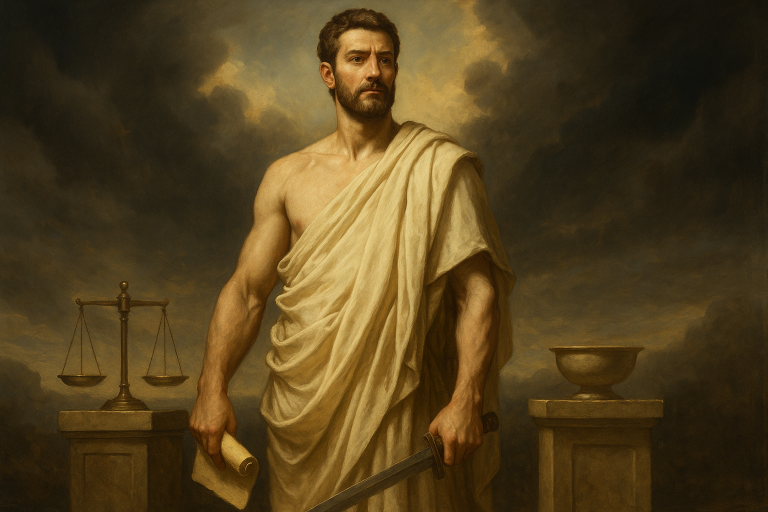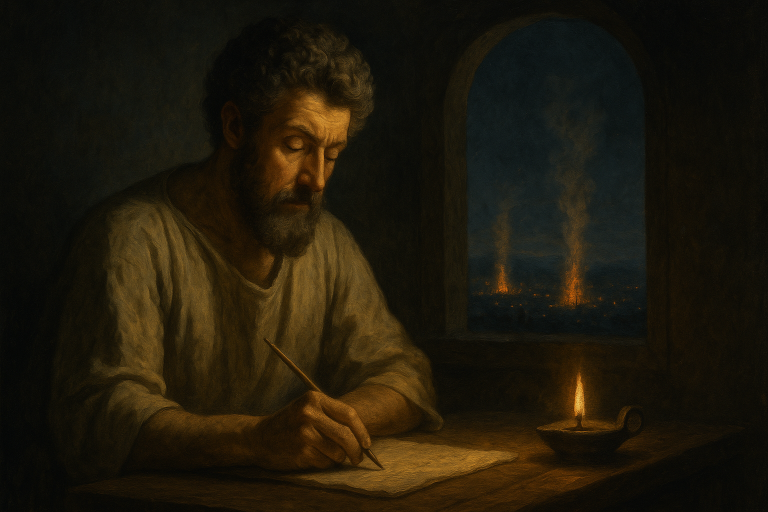The Rubicon · Caesar’s Point of No Return

Northern Italy, January 10, 49 BCE
The Rubicon was barely a river. More stream than barrier, shallow enough to wade across, narrow enough that the far bank was visible in the torchlight. But it was the boundary. On the north side, Caesar commanded a province and an army legally. On the south side, Italy began, and Roman law was absolute. No general could bring armed forces into Italy. Cross with legions, and you were a traitor. The penalty was death.
Caesar stood on the north bank with the Thirteenth Legion behind him. Fifty-one years old, a decade of Gallic conquest behind him, he had spent the past year trying to avoid this moment. He had offered compromises. He had negotiated. He had proposed creative solutions to let him return to Rome without facing prosecution from his enemies. The Senate, led by Cato and backed by Pompey, had refused everything. In December, they had declared an ultimatum. Give up your army and return, or be declared an enemy of the state.
Now, in the darkness of January, the choice was simple. Cross and start a civil war. Stay and face destruction.
He paced the bank. His officers watched. Some urged caution. Others urged action. The calculations ran through his mind. If he crossed and lost, he died, his family was destroyed, his name cursed forever. If he stayed, his enemies would prosecute him, exile him, or kill him. There was no middle ground left. The Senate had made sure of that.
He gave the order. The legion began to move. As they started across, Caesar spoke the words that would echo through history: “Alea iacta est.” The die is cast.
By morning, the Thirteenth Legion stood on Italian soil. The civil war had begun. The Roman Republic, in any meaningful sense, had ended.
The Boundary and the Trap
The Rubicon marked the edge of Italy proper, the sacred boundary between provincia and homeland. Roman law was clear and ancient. A general held imperium, military authority, only in his assigned province. The moment he crossed into Italy with armed forces, that authority ended. He became a private citizen leading a private army. Which meant he was leading a rebellion.
The law existed for good reason. It was meant to prevent exactly what Caesar was about to do. Military coups. Generals marching on Rome. The use of legions to settle political disputes. For centuries, the boundary had held. Generals disbanded their armies at the border, entered Rome as citizens, and trusted the political process to protect them.
Sulla had broken that precedent decades earlier, marching on Rome with his legions. But Sulla had been responding to an actual threat, to Marius seizing power illegally. Or at least that was the justification. The precedent was set. The boundary could be crossed. But it still carried enormous weight. To cross was to declare yourself outside the law, beyond compromise, willing to use force against your own state.
Caesar’s impossible position was that staying within the law meant death. His Gallic command was ending. He had to return to Rome. His enemies, led by Cato and the optimates, had charges waiting. Illegal acts during his consulship. War crimes in Gaul. They would prosecute him, convict him, exile him or execute him. Without his army, he was defenseless. With his army, he was a traitor.
For all of 50 BCE, he had tried to find a way out. He offered to disarm if Pompey disarmed simultaneously. Refused. He offered to keep his provinces but reduce his forces. Refused. He proposed that both he and Pompey retain small personal guards while giving up their armies. Refused. Every compromise was blocked by Cato in the Senate, who saw clearly that any deal acknowledging Caesar’s power would undermine senatorial authority.
Pompey, now the Senate’s champion, was convinced Caesar would back down. He had more legions, controlled Spain and the eastern provinces, commanded the seas. On paper, Caesar couldn’t win. So Pompey assumed Caesar wouldn’t try.
In December 50 BCE, the Senate issued its ultimatum. Caesar must disband his army by a set date or be declared a public enemy. In January 49 BCE, when Caesar didn’t comply, the Senate passed the senatus consultum ultimum, the emergency decree that gave magistrates unlimited authority to defend the state. Caesar was officially an outlaw.
The irony was perfect. The law designed to prevent military coups had created a situation where Caesar’s only options were surrender to certain destruction or rebellion. By refusing all compromise, the Senate had forced the very thing they feared. Caesar crossed because staying meant death. The boundary that was supposed to protect Rome trapped him into attacking it.
The Man at the River
Caesar at fifty-one was not the young politician who had bribed and maneuvered his way to the consulship. A decade in Gaul had transformed him. He had conquered territory twice the size of Italy. He had defeated Germanic tribes that Rome had feared for generations. He had crossed the Rhine and the English Channel, going where no Roman army had gone. He had turned Gaul from a barbarian threat into a Roman province. And he had done it with a combination of military genius, calculated brutality, and relentless audacity.
His veterans worshiped him. He knew their names, shared their hardships, rewarded their loyalty with wealth and status. The Thirteenth Legion standing behind him at the Rubicon would follow him anywhere. They had seen him charge into battle personally. They had watched him turn impossible situations into victories. They trusted him completely. And they were bound to him not just by loyalty but by mutual complicity. They had committed war crimes in Gaul under his command. If he fell, they fell with him.
But Caesar was more than a general. He was also a politician who understood power in ways Pompey never had. He had built popular support in Rome through massive public works, gladiatorial games, and debt relief. He had cultivated allies across the social spectrum. He knew when to compromise, when to push, when to retreat temporarily. His consulship in 59 BCE had shown his willingness to break norms when necessary, using mob violence to pass legislation when the Senate obstructed him. The First Triumvirate with Pompey and Crassus had shown his skill at coalition building.
His entire career had been built on calculated risks. He had gone into massive personal debt early on, borrowing enormous sums to fund political campaigns and public works. He gambled that military success would pay it back, and Gaul had paid it back a hundred times over. He had invaded Britain with minimal forces, crossed the Rhine when no one thought it possible, fought battles outnumbered and won through speed and tactical brilliance. Risk was his method. Audacity was his brand.
But this risk was different. This was the ultimate gamble. If he crossed and lost the civil war, he died. His family would be destroyed. His name would be cursed. His achievements would be erased. Everything he had built would collapse. His daughter Julia, who had been his tie to Pompey, was dead. That family connection, that personal affection, was gone. His allies would be forced to choose sides, and some would abandon him. His legacy depended entirely on victory.
What he calculated, standing at that river, was that he could win. Pompey was overrated. His legions were a mix of new recruits and garrison troops who hadn’t seen serious combat. The Italian cities hated the Senate’s taxation and remembered Sulla’s and Pompey’s brutality. They would welcome Caesar or at least not resist him. His own veterans were superior soldiers, hardened by a decade of constant warfare. Speed and boldness would compensate for smaller numbers. The Senate was paralyzed by internal divisions and couldn’t make quick decisions. Pompey would retreat rather than risk battle in Italy, giving Caesar time to consolidate.
He was right about all of it. But he couldn’t calculate everything. He couldn’t see that five years after crossing the Rubicon, he would be stabbed twenty-three times by senators claiming to save the republic. He couldn’t see that his clemency, his policy of pardoning enemies, would put the knives in the hands of men he had spared. He couldn’t see that winning the war would cost him his life.
At the river, all of that was future. All that mattered was the calculation. Risk versus reward. Death if he stayed, possible victory if he crossed. The die was cast. The legion moved forward.
The Crossing and the Campaign
The Thirteenth Legion crossed the Rubicon after dark on January 10, 49 BCE. It was a small river, easily forded, no resistance. Who would guard against the impossible? By dawn, Caesar’s army stood in Italy illegally. The message was sent to Rome: I’m coming. There was no turning back.
Caesar moved with stunning speed. He marched south, not destroying but liberating. City after city opened its gates without fighting. The Italian communities had no love for the Senate. They remembered Sulla’s proscriptions, Pompey’s executions, the grinding taxation that enriched senators while impoverishing provinces. Caesar offered something revolutionary: clemency. Surrender and you’re forgiven. No massacres. No proscriptions. No looting. Join me or stand aside, but I won’t kill you for having opposed me.
It was a calculated political move. Clementia, mercy, became his brand. It distinguished him from every previous Roman strongman. Sulla had killed thousands through proscription lists. Pompey had been brutal in his early campaigns. Caesar offered a different model. Submit and live. It was still submission, still an acknowledgment of his power. But it was submission without terror. For communities exhausted by decades of civil violence, it was an attractive offer.
Pompey, in Rome, was unprepared. His strategy was sound militarily but disastrous politically. Abandon Italy temporarily. Retreat to Greece and the eastern provinces where his power base was strongest. Gather overwhelming forces. Control the seas. Cut off Caesar’s supplies. Then return and crush him with numerical superiority. The plan made perfect sense. Except that to Romans, it looked like running away. It looked like abandoning the city, fleeing from Caesar, leaving Italy to the invader.
Pompey and the Senate evacuated. They sailed east with their forces, leaving Rome undefended. Caesar occupied the capital without a battle. He made a show of respecting republican forms, convening what remained of the Senate, proposing negotiations. But the reality was clear. He controlled Italy. Pompey controlled the East. The civil war had divided the Roman world.
The first year, 49 BCE, Caesar moved with characteristic audacity. He secured Italy in sixty days. He took Rome without violence. Then he marched to Spain, where Pompey’s legates commanded significant forces. Before leaving, he reportedly said, “I go to face an army without a general.” Then, after defeating Pompey’s Spanish forces, “Now I’ll face a general without an army.” It was swagger, but it was backed by results. By the end of 49 BCE, Caesar controlled the western Mediterranean.
In 48 BCE came the eastern campaign. Caesar crossed to Greece with a smaller force, cutting himself off from his supply base in Italy. Pompey had the numbers, the supplies, the naval superiority. At Dyrrachium, Pompey won the initial engagements, inflicting casualties and forcing Caesar to retreat. For a moment, it seemed Pompey’s strategy was working.
Then came Pharsalus. Pompey, pressured by the senators with him who didn’t understand military strategy, agreed to give battle. Caesar, outnumbered nearly two to one, won decisively through tactical brilliance and the superior quality of his veterans. Pompey fled. Caesar pursued him to Egypt, where the teenage Ptolemy’s advisors murdered Pompey and presented his head to Caesar as a gift. Caesar wept, whether from genuine grief or political theater. But the civil war’s outcome was decided.
The years after were mopping up. Egypt, where he famously dallied with Cleopatra. North Africa, where Cato committed suicide rather than accept Caesar’s pardon. Spain again, where the last significant resistance was crushed. Each campaign added territory, wealth, and power. By 45 BCE, Caesar was master of the entire Roman world. He returned to Rome not as consul or general but as dictator perpetuo, dictator for life.
The crossing had worked. The gamble had paid off. Caesar had calculated correctly. But the cost was still being tallied.
The Consequences
The Rubicon didn’t kill the republic. It revealed that the republic was already dead. The system couldn’t contain its own successful generals anymore. Military power had become greater than political authority. Personal armies loyal to individuals were stronger than institutions loyal to the state. Sulla had shown this decades before. Pompey had bent the rules repeatedly. Caesar just took the final step that made the reality undeniable.
Once Caesar crossed, the precedent was set completely. Civil war became the way Roman political disputes were settled. After Caesar’s assassination in 44 BCE, his heirs and his killers fought another civil war. Octavian versus Antony. Antony versus Octavian’s allies. Another round of battles, proscriptions, and political murders. The pattern repeated because there was no mechanism left to resolve disputes peacefully. Military might decided who ruled. The Senate became ceremonial. The principate, the empire, was inevitable.
Caesar’s clemency was revolutionary. Unlike Sulla, who had published proscription lists and killed thousands, Caesar offered pardon to enemies who surrendered. Cicero, who had opposed him, was pardoned. Brutus, who would later kill him, was pardoned. Cassius, another assassin, was pardoned. Most of the senatorial class was pardoned. Caesar wanted to unite Rome, not purge it.
But clemency was also a political weapon. It required submission. To be pardoned, you had to acknowledge Caesar’s authority to grant pardon. You had to accept that he held power over your life and chose to spare you. “I forgive you” means “I have power over you.” Caesar’s mercy was real, but it was mercy from a position of absolute authority. It created grateful clients, but it also created resentful subjects who remembered that they lived at his sufferance.
What Caesar created in those five years between the Rubicon and his death was a template. He didn’t call himself king. Romans had hated kings since Tarquin’s expulsion five centuries earlier. The title was poisonous. But Caesar had a king’s power. Dictator perpetuo. Control of the army. Authority to pass laws. Power to appoint magistrates. He reformed the calendar, creating the Julian calendar that, with minor modifications, we still use. He launched massive building projects. He extended Roman citizenship to communities across the empire. He created client kingdoms and appointed their rulers. He did everything a king did without the title.
His heir, Octavian, who became Augustus, learned the lesson perfectly. Keep the republican forms. Maintain the Senate, the consulship, the offices. But hold the actual power. Don’t call yourself king. Call yourself princeps, first citizen. Don’t abolish the republic. Just make it ceremonial while you hold imperium. That system, the principate, lasted four centuries. It worked because Augustus understood what Caesar had proven: Romans would accept one-man rule if you didn’t call it that.
For Caesar personally, the consequences were immediate and fatal. He won everything and lost his life. Five years from the Rubicon to the assassination. March 15, 44 BCE. The Senate house. Twenty-three knife wounds. Brutus, Cassius, and dozens of others, many of them men he had pardoned, claiming to save the republic by killing the tyrant.
But they couldn’t restore what Caesar had destroyed. His death just created more civil war, more instability, more violence. His heir won. The republic stayed dead. Caesar’s crossing at the Rubicon had ended something that his assassination couldn’t resurrect.
The question that haunts the story is whether Caesar destroyed the republic or just finished what was already dying. The republic’s system couldn’t control its own successful generals. It couldn’t prevent ambitious men from raising private armies. It couldn’t reconcile the vast wealth and territory of empire with the political structures designed for a city-state. Caesar didn’t create those problems. But he was ruthless enough, brilliant enough, and ambitious enough to take advantage of them completely.
Perhaps the republic needed reform and got dictatorship instead. Perhaps there was no path to reform that didn’t go through one-man rule. Perhaps Caesar was both necessary and terrible. The Rubicon forces the question but doesn’t answer it. All it shows is that once crossed, the old system couldn’t be restored. Whatever came next would be different. And it was.
The Symbol
“Crossing the Rubicon” entered every language influenced by Latin as a metaphor for the point of no return. The decision that can’t be undone. The moment of commitment to an irreversible course. It’s used in politics, business, personal relationships. Everyone understands the meaning instantly. You’ve crossed your Rubicon when turning back becomes impossible.
The phrase resonates because we all face smaller Rubicons. The job you accept that closes other paths. The relationship you commit to that ends others. The words you speak that can’t be taken back. The choice you make that eliminates the alternatives. Caesar’s was dramatic, his legion crossing in darkness, civil war and dictatorship following. Ours are quieter. But the structure is the same. Before the crossing, options exist. After, you’re committed to the consequences.
Caesar calculated he could win, and he did. He conquered his enemies, dominated Rome, reshaped the Mediterranean world. His calculation proved correct on every military and political level. But he couldn’t calculate the resentment his clemency would create, the fear his power would generate, the conspiracy his dominance would spawn. He thought he could hold absolute power without consequences. He was wrong. Five years after the Rubicon, he died surrounded by men stabbing him with daggers, many of them people he had pardoned.
The historical irony is thick. Caesar’s crossing “saved” Rome from a corrupt, paralyzed Senate that couldn’t govern effectively anymore. But it killed republican government, the system of shared power and institutional checks that had made Rome great. Was he necessary? Probably. The republic was broken. Was he worth the cost? Rome survived another four centuries as an empire, longer than it had lasted as a republic. But the price was liberty, or at least the pretense of liberty. Necessary evil or ambitious tyrant? Both, impossibly tangled.
Modern parallels appear constantly. Every strongman claims necessity. Every seizure of power claims emergency. “I must break the law to save the system.” The pattern repeats. Cicero executed conspirators without trial to save the republic. Caesar crossed the Rubicon to save himself and, he claimed, to save Rome from senatorial corruption. Augustus concentrated power to save Rome from civil war. Always, the ends justify the means. Always, emergency powers become permanent. Always, the Rubicon gets crossed by someone claiming they had no choice.
The dangerous lesson of the Rubicon is that sometimes it works. Caesar did save Rome from senatorial dysfunction. His reforms were necessary. His centralization of power did bring stability eventually. But it also destroyed the republic forever. Both things are true. The question is whether the trade was worth it. And that question, like Caesar at the river, has no answer that satisfies everyone.
The Point of No Return
January 10, 49 BCE. A small river in northern Italy. One legion crossing in darkness. Caesar speaking the words: “The die is cast.”
There was no thunder. No dramatic storm. No portent from the gods. Just a shallow stream and a military unit wading across. By morning, everything had changed. The civil war had begun. The republic had ended. Not officially. Not immediately. But effectively. The forms would continue. The Senate would meet. Consuls would be elected. But the reality was different. Power had shifted to the man with the army. And once shifted, it would never shift back.
The republic didn’t die at Pharsalus when Pompey was defeated. It didn’t die on that Egyptian beach when Pompey was murdered. It didn’t die in the Senate house when Caesar was assassinated. It died at the Rubicon. It died when one man decided that force was the answer to a political dispute. When calculation replaced constitution. When personal survival mattered more than institutional integrity.
The Rubicon still flows in northern Italy. The exact location is lost. Rivers shift over centuries, and no one marked the precise spot where Caesar crossed. It doesn’t matter which stream it was. The crossing is what mattered. One night. One choice. One legion. The point where return became impossible.
Caesar won his war. He conquered his enemies. He dominated Rome. He reformed the calendar, the government, the empire. He achieved everything he wanted. Then, five years later, he died with twenty-three stab wounds, surrounded by senators who thought killing him would restore the republic.
It didn’t. The republic was already dead. It died at a river too small to swim. It died when the boundary meant to protect Rome became the boundary that trapped Rome into civil war. It died when the choice became cross or die, with no middle ground left.
Caesar won his war and lost his life. But the republic lost everything at the river, and never crossed back.






